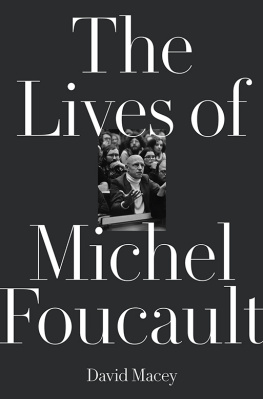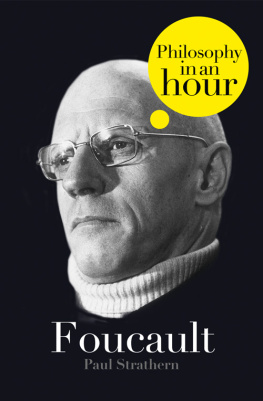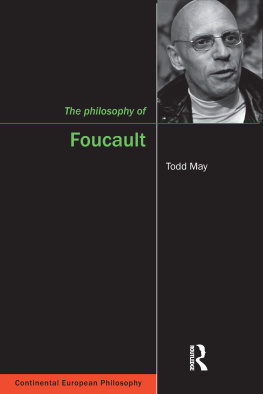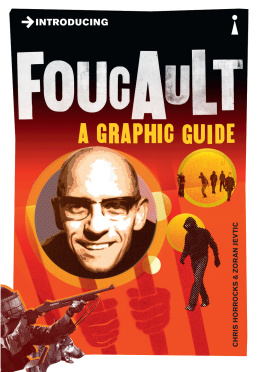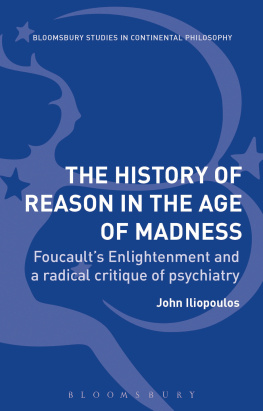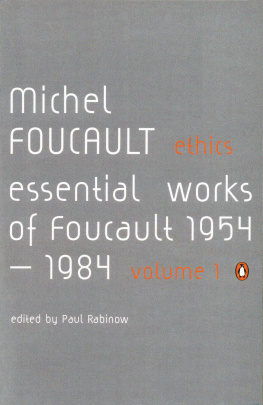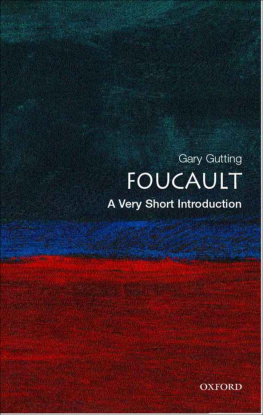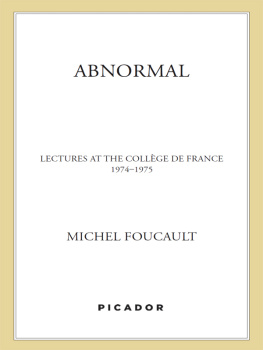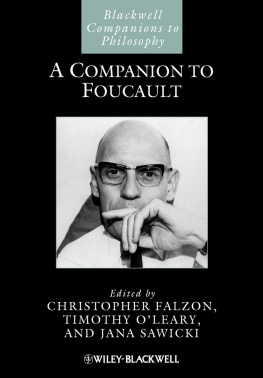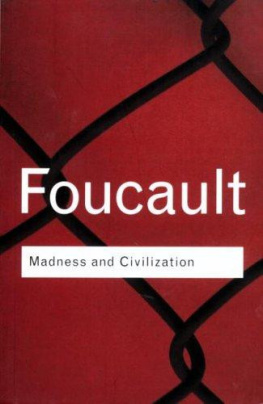Contents

The Lives of
MICHEL FOUCAULT
BY THE SAME AUTHOR
Lacan in Contexts
Frantz Fanon
Michel Foucault
The Lives of
MICHEL FOUCAULT
A BIOGRAPHY
David Macey
Afterword by Stuart Elden

To Aaron, John and Chantelle,
for all you have given us in such a short time,
and in affectionate memory of Antoine Roquentin
This edition published by Verso 2019
First published in the United States by Pantheon Books 1994
First published in Great Britain by Hutchinson 1993
David Macey 1993, 1994, 2019
Afterword Stuart Elden 2019
All rights reserved
The moral rights of the authors have been asserted
1 3 5 7 9 10 8 6 4 2
Verso
UK: 6 Meard Street, London W1F 0EG
US: 20 Jay Street, Suite 1010, Brooklyn, NY 11201
versobooks.com
Verso is the imprint of New Left Books
ISBN-13: 978-1-78873-104-1
ISBN-13: 978-1-78873-105-8 (UK EBK)
ISBN-13: 978-1-78873-106-5 (US EBK)
British Library Cataloguing in Publication Data
A catalogue record for this book is available from the British Library
The Library of Congress Has Cataloged the Pantheon Edition As Follows:
Macey, David, 1949
The lives of Michel Foucault / David Macey.
p. c.
Includes bibliographical references and index.
ISBN 0-679-43074-1
1. Foucault, Michel. 2. PhilosophersFranceBiography.
I. Title.
B2430.F724M327 1994
194dc20
[B] 93-28220
CIP
Printed and bound by CPI Group (UK) Ltd, Croydon CR0 4YY
CONTENTS
My gratitude is due to those who shared their memories of Foucault with me, provided information and supplied contacts, to a number of institutions, and to one who listened and read:
Maurice Agulhon, Michel Almaric, Jacques Almira, Claire Ambroselli, Didier Anzieu, Sylvie-Claire dArvisenet, Association pour le Centre Michel Foucault, Margaret Atack, Robert Badinter, Etienne Balibar, Jean-Pierre Barou, Zygmunt Bauman, Neil Belton, Bibliothque du Saulchoir, Pierre Bourdieu, Roy Boyne, Brotherton Library (University of Leeds), Catherine von Blow, Georges Canguilhem, Robert Castel, Hlne Cixous, Jeannette Colombel, Jurandir Freire Costa, Regis Debray, Daniel Defert, Frdric Deneuville, Laurent Dispot, Jean-Marie Domenach, Bernard Doray, Jean Duvignaud, Gregory Elliott, Didier Eribon, Franois Ewald, Arlette Farge, Serge Fauchereau, Alain Finkielkraut, John Forrester, Denys Foucault, Grard Fromanger, Francine Fruchaud, Henri Fruchaud, Mike Gane, Carl Gardner, Philippe Gavi, Clio Garcia, Colin Gordon, Andr Green, Flix Guattari, Malcolm Imrie, Douglas Johnson, Chaim Katz, Georges Kiejman, Denise Klossowski, Pierre Klossowski, Bernard Kouchner, Jean Laplanche, Annette Lavers, Antoine Lazarus, Jacques Lebas, Dominique Lecourt, Serge Livrozet, Jean-Franois Lyotard, Roberto Machado, Pierre Macherey, Edmond Maire, Claude Mauriac, Philippe Meyer, Jean-Franois Miguel, Franoise-Edmonde Morin, Jean-Pierre Mignard, Modern Languages Library (University of Leeds), Liane Mozre, Toni Negri, Michelle Perrot, Jean-Pierre Peter, Jean Piel, Danile Rancire, Jacques Rancire, Jonathan Re, Christian Revon, Franois Roustang, Yves Roussel, Ren Schrer, Dominique Seglard, Lucien Sve, Anne Thalamy, Georges Verdeaux, Jacqueline Verdeaux, Marie-Thrse Vernet, Paul Veyne, Pierre Vidal-Naquet, Simon Watney, Jeffrey Weeks.
Unless otherwise stated, all translations are mine. All quotations from the works of Michel Foucault have been retranslated; existing English-language translations are listed in the bibliography.
Introduction:
I, MICHEL FOUCAULT
I n his masterly life of Bernard Shaw, Michael Holroyd remarks: Biographies of writers are written in collaboration with the posthumous subject of the biography. is rather more recalcitrant than Shaw. Alive, he would have rejected the advances of any biographer; in death, he still struggles to escape them.
On 25 June 1984, Michel Foucault died at the age of fifty-seven from the complications attendant upon his infection with the human immuno-deficiency virus. His last two books had just been published and were being widely discussed in the press. When he died, he was without doubt Frances most prominent philosopher, and had achieved the unusual distinction of entering the best-seller lists with Les Mots et les choses, a dense and difficult book written, according to its author, for a small audience of specialists. He had successfully crossed the great divide that separates the purely academic world from the broader cultural sphere. For almost fourteen years, he had taught at the Collge de France, the most prestigious institution in the French academic world. He had been fted in the United States, and translations of his works had given him an international reputation from Brazil to Japan. Indeed, his international reputation has almost eclipsed his reputation in France. Many if not most of the studies of Foucault to be found in Parisian bookshops are translations from the English.
Foucault lived many lives as an academic, as a political activist, as a child, and as a lover of men. He lived a very public life, and also a very private one. To a large extent, Foucaults life was also the intellectual life of France. There are few changes that are not reflected in his work, and there are few developments that he did not influence. His biography is also of necessity an intellectual history of his times. In an unexpectedly generous tribute, the German philosopher Jrgen Habermas, who could be very critical of Foucault, wrote: Within the circle of the philosophers of my generation who diagnose our times, Foucault has most lastingly influenced the Zeitgeist.Foucault had witnessed and reacted against the dominance of Sartrean existentialism, and had been part of the generation that discovered or rediscovered Hegel, Nietzsche and Heidegger. He was taught by Louis Althusser and Maurice Merleau-Ponty. In the 1960s, he was popularly perceived as being one of the structuralist Gang of Four, its other members being Jacques Lacan, Roland Barthes and Claude Lvi-Strauss. A decade later, he was associated with the so-called new philosophers in their precipitate retreat from Marxism and Maoism. In his final years, another change of direction led him to the quiet contemplation of Stoic philosophy and to the exploration of a possible new ethics.
The multiplicity of Foucaults lives makes it difficult to arrive at any satisfactory periodisation of his work. In their very influential study, Dreyfus and Rabinow propose a four-stage schema: a Heideggerean stage, an archaeological or quasi-structuralist stage, a genealogical stage and, finally, an ethical stage. The schema is not entirely unsatisfactory, but it has the disadvantage of reducing a complex life and body of work to a uniquely philosophical dimension. It makes no allowance for the trajectory that took Foucault from membership of the Parti Communiste Franais, through a period of political quietism to a period of full-blooded leftist militancy and then to a concern for human rights. Nor does it take account of the important literary phase in Foucaults career.
In November 1971, Foucault took part in a debate with the American linguist Noam Chomsky on Dutch television. The debate was to have been preceded by a short film on Foucault; he flatly refused to provide any biographical information and the film was never made. To say that the history of his books is to a large extent the biography of Michel Foucault is, at one level, almost a truism. His biography is, that is, the story of a thought, a work in progress. In such statements, Foucault appears to be hinting at some deeper relationship between author and text. In a discussion of a favourite author, he was slightly more explicit, and can even be seen as supplying a formula for his own biography. Referring to the novelist and poet Raymond Roussel, he argued:

